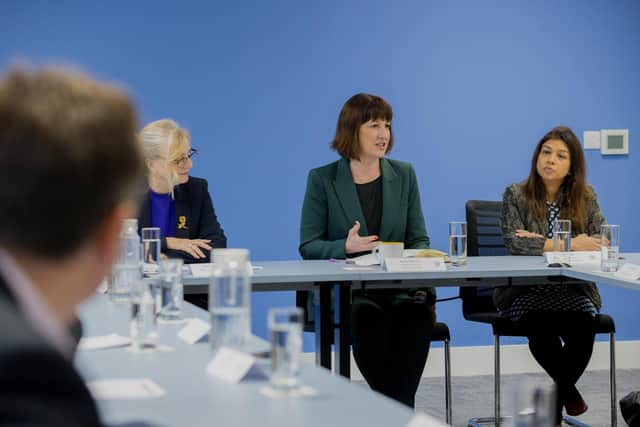Rachel Reeves: Labour will grow the economy not 'fiddle around' reforming the tax system
In an exclusive interview with The Yorkshire Post, Rachel Reeves said that her party would not be looking at a review of the British tax system but will instead focus on delivering growth that would allow for tax breaks for working people.
Ms Reeves has previously said that Labour wants to get rid of “unfairness in the tax system”, adding that “we should be spreading the burden and creating a fairer system”.
Advertisement
Hide AdAdvertisement
Hide AdHowever, the Leeds MP said during a visit to a major asset management company in the city that her priority is to grow the economy, rather than “fiddle around with different tax rates”.


When asked if Labour had any ambition to reform the current make-up of personal taxes, Ms Reeves said that she does not want to add to the current tax burden, implying that wholesale tax reform would require some people’s taxes to increase.
“I don't wake up in the morning thinking about how I can add to the tax burden that businesses and families are already paying,” she said.
“I think taxes on working people have gotten too high. I would like them to be lower, but the most important thing is growing the economy.
Advertisement
Hide AdAdvertisement
Hide Ad“Stability is key to that, not playing fast and loose with the public finances, because when you do that, you play fast and loose with family finances.”
Ms Reeves was speaking ahead of the launch of Labour’s financial services review recommendations, which she claimed would see £1.3 billion a year extra generated in Yorkshire.
Both Labour and the Tories have faced calls for a substantial overhaul of the tax system for years, with economists and think tanks highlighting deep-rooted problems which are a barrier to equality and growth.
Last year Isaac Delestre, an economist for the Institute of Fiscal Studies, noted that there are “few corners of the British tax system that are not in urgent need of repair”, including Council Tax, National Insurance, VAT, and Stamp Duty.
Advertisement
Hide AdAdvertisement
Hide AdCouncil Tax, for example, is still based on property values as they were in 1991.
“Ideally you’d commit to looking at every single tax on the books and completely overhauling the system,” said Ben Ramanauskas, a Research Fellow in Economics at Oxford University.
“Just tinkering with it doesn’t really help anyone and instead adds even more complexity to the system - which itself creates more problems for businesses.”
He noted that a major overhaul of taxation would likely need a large majority in Parliament to enact early on in a Labour administration.
Advertisement
Hide AdAdvertisement
Hide Ad“Some of the reforms could be a difficult sell and would require a lot of bandwidth to work on, but doing unpopular things early on is what governments tend to do (and should do),” he added.
Labour will however press ahead with its review of business taxes after Ms Reeves last year announced that Labour will review the UK’s business tax regime in order to remove barriers to growth and make Britain the fastest growing economy in the G7.
Labour’s reforms to business taxes will not however utilise the Office for Tax Simplification as mentioned during the review's announcement last year.
The OTS was an independent body created by George Osborne to identify complexities that could be ironed out of the tax system, until it was closed by the then-chancellor Kwasi Kwarteng in 2023.
Advertisement
Hide AdAdvertisement
Hide Ad“We don't have any plans to bring back the Office of Tax Simplification, but we will be publishing soon the roadmap on business taxation, and the next steps on that,” she said.
It comes after a report by the Institute of Fiscal Studies (IFS) said that the next Government may have to row back on promises of tax cuts during general election campaigns as the UK economy faces some of its worst problems since the 1950s.